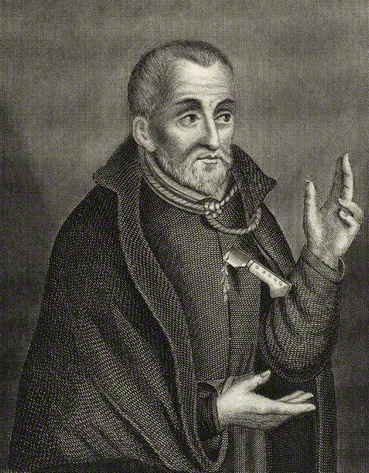Why are students at this Oxford college, a symbol of international Christian welcome, struggling to get UK visas?

Reading the Conservative Party Election Manifesto, while sitting in Lafayette Park near the White House in Washington DC, made me think about St Edmund Campion. Why? Because I was hearing that students from some parts of the world were having problems getting a visa to enter Britain in order to attend the Jesuit Foundation in Oxford, Campion Hall.
Why would I care if they were able to attend the college that carries the name of this obscure saint? Let me explain.
I am a fellow of Oxford's Saint John the Baptist College, and taught Physics there for many years before moving to the University of Sheffield. The college is a Marian, Catholic, foundation, part of the efforts to recover from the destruction of those other places of learning, the monasteries, by Mary's Father, King Henry the Eighth.
Campion (1540 – 1581), one of the earliest fellows of my College, had to flee Oxford and England, to escape as the wave of Protestantism persecution. It was Campion who enchanted Queen Elizabeth on her visit to the dreaming spires, but her minions would later torture and execute him.

And now there is a new scholarly biography of Campion by Gerard Kilroy. In that book the words of Campion made me despair of my country. As if I needed that now! But they also gave me some hope.
Kilroy's biography tells how Campion escaped first to Ireland and, while hidden in an attic, wrote a history of that land. I was surprised and delighted by the stark difference between Campion's world view and those of other English writers of that time. Unlike other contemporary authors he talked about the Irish love of language and poetry, of their warmth and hospitality. He saw poets and heroes on horseback amongst the poverty.
After reading this I thought: how much have we changed since then? And the answer is not a lot. The language used by most of the English of the time of Campion to describe the Irish of that time sounds an awful lot like the way anti-semites have talked of Jews down the ages and, yes indeed, like the way some people talk about Muslims in our own times today.
But Campion didn't use that language. Why was that? Can we only speculate why he saw further past the differences than others did? Well let's try.
I think we have to recall he was a true scholar. In fact Kilroy hammers home in his book just how devoted Campion was to scholarship. Access to books was a necessity and a joy to him. I think a true scholar is restless and difficult to hoodwink. Simple pictures of people make him suspicious. A true scholar reads and listens and thinks. He reads the works of scholars from many lands, from a Church which is universal, global, connected through a faith that sees no borders.
I also like to believe that Campion had been given an important insight into generosity. He had seen the City of London in the days of Campion's youth take up the challenge as the poor and dispossessed, many driven off church lands, flooded the City. They built schools and colleges and even raised money for beds for the homeless. Campion had been one of the orphans taken in by the Lord Mayor himself. So Campion knew what real charity to the great unwashed was.
After leaving Ireland, Campion continued his exile in Rome and Prague. Prague is the place where it appears he enjoyed teaching the most. Unfortunately for him these peaceful and happy times came to an end when Campion was ordered back to preach the Catholic faith. He was send back to England at a time when being a Catholic Priest was part of the attack on the Protestant order. His brutal torture and subsequent execution made him a Martyr of the Church and now he has a college that bears his name and so speaks to his legacy.
Edmund Campion's words – 'my country's borders lie around my heart' being just one example – have shown me again that even in a time when the general mood is against toleration and love, a scholar, a fellow of my very own college, could see through it to understanding and admiration of people that others barely thought of being of the same race.
But those good and kind scholarly words can still be kept in a gilded cage. It is not enough for us to make civilised observations within the enclave of academia. We have to speak when we see absurd views dressed up as the sensible opinions of others, wherever they come from. They are dangerous for our country and its future.
Campion Hall is a now place where Jesuit scholars and their students come from many lands to work away at their books.
They have a faith and a commitment to scholarship and community that knows no borders. They are true followers of Campion.
That is something worth cherishing and protecting by us all. Given what it stands for, it would be a sadness and an irony if Campion Hall were unable to welcome students from around the world. More than that, it would be a statement, a sign, of the present times in which we live, and about which Campion himself would have something to say if his words were to be heard by us still.
Professor Sir Keith Burnett is Vice-Chancellor and President of the University of Sheffield. He is also President of the UK's Science Council and a member of the UK Prime Minister's Council of Science and Technology. Sir Keith actively supports international communities and founded the #WeAreInternational campaign to support intentional students, staff, communities and refugees. On Twitter @sheffielduni











